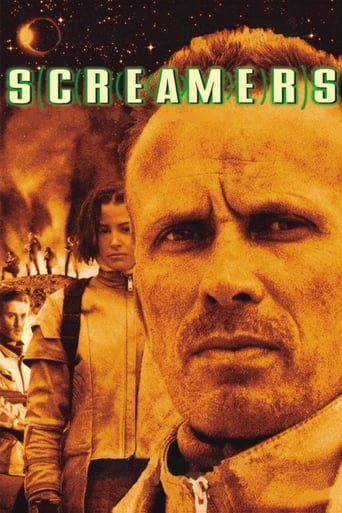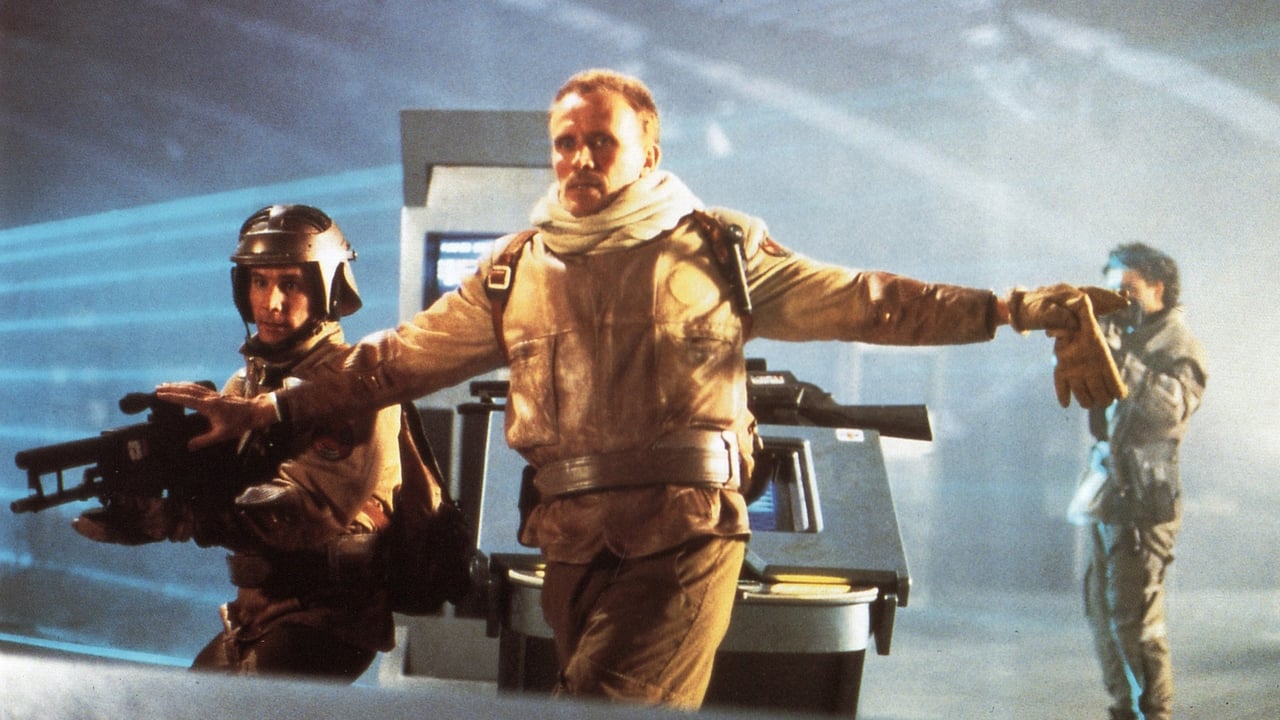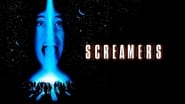Dragonsouls
I decided to watch Screamers because I'm a big Phillip K. Dick fan, and this was a film based on one of his stories I never read yet. I had realized I overlooked the movie for way too long. I originally thought the movie was outdated, since I have experienced the human/robot social films for a while now, mostly with Battle Star Galactica, Blade Runner, i, Robot, and even Terminator. However, this is one of the first and original stories to convey the human/robot social conflicts and was glad to find the film on my video on demand lists.Worth mentioning first is the fine acting by Peter Weller, and I can't help but wonder why he never became more than a cult film actor, he truly could have been a big time action star on par with the other heavyweights of the 90s. And he really is convincing in this film, as a man who was on the brink of madness from desolation and hardship. As for the supporting cast, excellent performances for a low budget film. It reminded me of a time when all Science Fiction films were B-movies, before the Star Wars and Star Trek's came along.Come to think of it, the film had a decent sized budget for a 90s film. Nothing like other adapted Phillip K. Dick novels had gotten, such as Blade Runner, Minority Report, or Total Recall, but still, Screamers is a story that needed a bigger budget and if it had gotten one, this film would be a classic to be mentioned in the same breath as Dick's other masterpieces. The story reminded me of Blade Runner in some ways, and another short by Dick called "The Defenders" In a sense, Dick re-tells his themes over and over again, but nevertheless, Screamers is well written and unique in its own way. It's just perplexing why this film didn't come out in the 70s, or even early 80s, before the original Battle Star Galactica, and before Terminator, etc. This story would have made for a very pioneering film.
Richie-67-485852
This is a surprise movie meaning that turns out to be a great movie when you were expecting just a good one. The story has to be respected and understood. Then, what happens after that falls into place nicely. I am totally disappointed that they did not make a sequel to this winner. It was certainly set-up to do so. It has what I call genuine and satisfying scary moments brought to you via intelligence, not shock. Anytime you can engage the viewers imagination in a quality way after a movie viewing (as well as during) means you got a success on your hands. This is certainly one of those movies. The concept presented of something man has done that has mutated into something else is a good one. Now, if that something else wants to compete and then eliminate man, well you got my full attention thus this movie. Science Fiction treads a fine line of being believable or not when introducing a story. It doesn't have to be perfect to make its point. It has to be respectful and this movie respects the viewer. You will not have any trouble getting into this movie after the first few minutes. Then, all the dots start to connect and cause a viewing pleasure. It will suck you right in and when the ducks line up, scare you good and proper..Enjoy with a favorite snack so you don't bite your nails
tieman64
"We are now in a new form of schizophrenia. No more hysteria, no more projective paranoia, but this state of terror proper to the schizophrenic. [
] The schizophrenic can no longer produce the limits of its own being. [
] He is only a pure screen." - Baudrillard "That's right - Pinnochio's not a real little boy!" - Becker ("Screamers")Scifi author Harlan Ellison once took James Cameron to court, alleging that the director's 1984 film, "The Terminator", plagiarised "Demon With A Glass Hand" and "Soldier", two tales written by Ellison in the 1950s.But Cameron, a scifi nut, seems to have also borrowed heavily from Philip K Dick's "Second Variety", a 1953 short story which finds the world ravaged by war and mankind locked in combat with a race of machines. These machines were created for defence purposes, but eventually became "self aware", started evolving, making armies, factories and hunting down humans, whom they sought to completely eradicate. The machines then began creating terminator-like infiltration units; cyborgs which convincingly resemble humans and which are programmed to penetrate human bases. Dick's hero, a resourceful soldier, even resembles Cameron's Kyle Reese, and much of Dick's dialogue, desperate, fast and apocalyptic, recalls the frenetic banter in Cameron's "Terminator".While "Screamers", Christian Duguay's adaptation of Dick's "Second Variety", barely captures the tone and urgency of Dick's short story, Cameron's "Terminator" films do, though all these "adaptations" are more interesting in the way they demonstrate how Dick's approach to scifi changed from the 1950s onwards. All of Dick's novels are ontological conundrums, taking place in a landscape in which all "reality" seems to be constantly shifting, and in which worlds and selves constantly seem to fall apart. For Dick, there is no definitive reality, human identity itself is uncertain, nothing exists as it seems, and everything is simply a perception of pure information. In "Second Variety" these themes are approached in a fairly simple manner ("Is it an undercover killer robot or is it a human?", "What constitutes a robot?", "What constitutes a human?", "Aren't humans already cyborgs?", "How do I know what is real?", "How do I know what is machine?", "How do I know what I think I know?"), which is largely why it, and Dick's early work, remain his most popular. As Dick turned to drugs, stopped proof-reading, stopped perfecting and re-writing his stories, abandoned conventional narrative structures and started churning out novels quickly in a desperate attempt to pay his bills, his books, like his heroes and his own state of mind, became increasingly schizophrenic, paranoid and shapeless. Many deride Dick for this, but such a stance was the logical continuation of his early 1950s work. Today, Dick's later writing bare a striking similarity to postmodernist theories by thinkers such as Jameson, Baudrillard and Brian McHale. Dick anticipated the twenty-first century network society, a fragmented, culturally overloaded, media saturated world characterised by rapid technological change, constant movement and a dizzying, excessive and sometimes surreal aesthetic. For Dick, the future, our postmodern present, would morph into a sort of virtual reality game. A "consensual hallucination" in which all traditional demarcations or distinctions are erased. It is no longer an issue of there being a split between man and robot, but of man and technology constantly co-mingling, of both servicing the other, of all being technology, of man himself already being cybernetic, of the world already being cyberspacial, representational, all emotions faked, all behaviour play-acting, every object in quotes, everything grounded on the illusory. Whereas in an explicitly modernist film such as "Metropolis" the dichotomy between the original copy or experience (man) and the replication (machine) is very clear, in later Dickian films ("Blade Runner", Total Recall", "A Scanner Darkly", "Matrix", Cronenberg, Assayas etc - note how comparatively conservative Spielberg's version of Dick's "Minority Report" is) a crisis of representation occurs, as the signifier is now alienated from the object it signifies, a Deleuzian "schizoid existence" brought about by a breakdown "in the signifying chain".Unlike the apocalyptic, cosily hopeful rubble of "Terminator" and "Second Variety", later Dick also posits a urban, networked and mechanical landscape which engenders a consequential decline in organic feeling and sensibility. Men then become "consumers of illusion", an illusion of "belonging and participation" covering up massive industrial alienation. But every connection seems to lead back to corporations, a "soft fascism" whose grid it is impossible to escape. Here, everything is organised by the constant flow of money, all landscapes are advertising-saturated and the "goal" of commerce is to destroy history itself, to put its customers in the eternal Now, the big happy theme park of desires. No surprise then that one of Dick's last stories, "Stability", takes place in a world in which mankind doesn't progress anymore, despite the illusion of constant, hyper-motion. The story's solution? The invention of a Terminator-like time machine. If Dick got one thing wrong, it was in his assumption that this "schizoid existence" would trouble or traumatise man. Today, the opposite is true. Man's adapted. He loves his cage, even as he fantasises about Judgement Day.So postmodernist theory has itself has become what Brian McHale calls the "sister genre" of science fiction, both revolving around similar themes (What is reality? What constitutes the authentic human being?) and issues of technology and its effects on society and the individual subject. And while modernism was mainly interested in epistemology, the condition of knowledge, both Dick's scifi and postmodernism are governed by ontology and the basic conditions of existence. But "Screamers" and "The Terminator" films represent a kind of outdated, 1950s Philip K Dick, with nice easy, clear demarcations best suited for action cinema. Latter Dick is perhaps unsuited to the medium of cinema itself, though some of Olivier Assayas' more trashy films capture well his style ("Boarding Gate", "Demonlover").7.9/10 – Worth one viewing.
adamspencer2275
I watched Screamers again this week as it was a cheap double pack DVD (which also contained 2009 Screamers 2 - the hunting.) I remembered watching this flick in the late 90's, but could not remember much about it. I was pleasantely reminded this week. Screamers is well written with plenty of mystery, suspense and character development. The story is developed without excessive need for any of the characters to explain what is going on; which is always a plus (take note Star Wars prequels!) I found that I was interested in the story and kept wanting to know what was going to happen next. I was able to identify with the characters and thought that Peter Weller was at his best.Worth a watch! But do not touch Screamers 2 it is complete drivel.


 AD
AD








